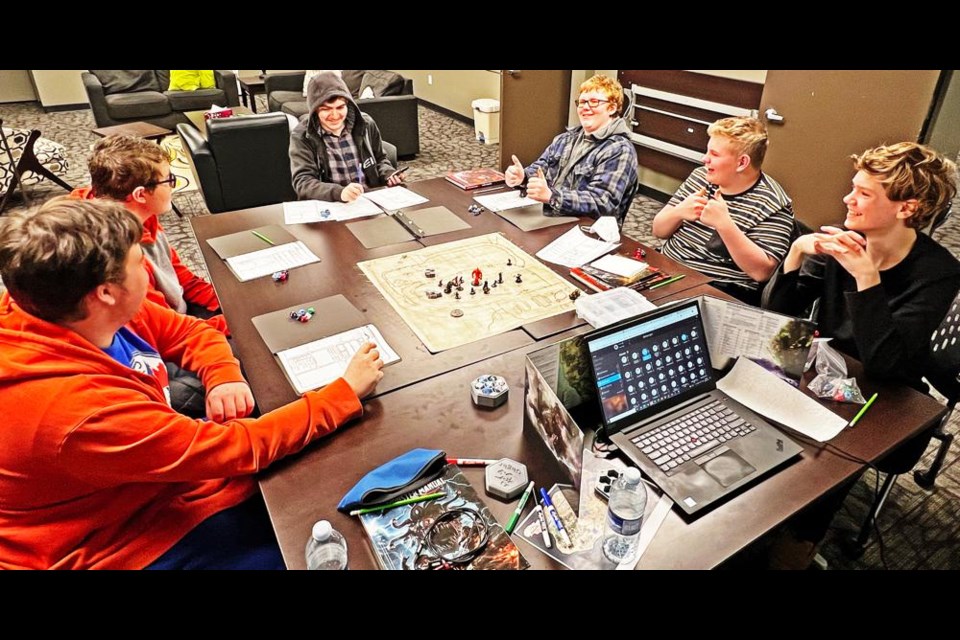WEYBURN – During any given week, Ian Isaak is part of the team of pastors at the Weyburn Free Methodist Church, but for aficionados of the role-playing game Dungeons and Dragons, he is the “Dungeon Master” who organizes and runs the game for two very different groups.
One group plays at the Weyburn Public Library every other week, and the other is focused on teens on autism spectrum, and began as a social program through the Saskatchewan Health Authority for this region.
He and his son Marcus began to attend the library game as a father-and-son activity about three years ago. When the library had to close due to COVID, it shut the game down as well, but it has since started back up and is now full with the prospect of possibly a second group to play.
When Isaak wanted to restart the D&D group, he looked for a Facebook page to advertise the game on, but found there wasn’t one for gaming in Weyburn. There was a page for a Pokemon group, but they wouldn’t allow him to post about starting a Dungeons and Dragons group, so he started a new page, the Weyburn Gaming Community page.
Around the same time as he and Marcus began playing the game at the library, he was contacted by the health region about running a D&D game with autistic teens. They provided a room at Tatagwa View, and he started that game going.
Once the program funding ended, he and a number of the parents got together and they requested that he continue to organize the game, as their sons were really enjoying it.
This group started small, but then Isaak started getting texts from other parents of autistic teens asking to join, and in a short time this game filled up. For the first while, they played online, but have now resumed in-person playing, meeting at his church.
“Dungeons and Dragons is primarily a storytelling game, a table-top role-playing game set in a fantasy world. You come with dice, your character sheets that has all of the stats on your character, the manuals. In the library game you have people who have played hundreds of games to a 13-year-old. This is his first game and he wanted to learn. Really it’s a communal social story-telling game,” explained Isaak.
His son Marcus helps him to run the game with the autistic boys, as he helps them understand the rules, or to fill in the sheets about their characters.
“Sometimes the boys need a bit more help determining the rules of the game or the mechanics of the game,” said Isaak.
He admits he doesn’t know a lot about how autism works, but he has seen growth in the boys and in their understanding and self-confidence as they meet and play together. He recalled one boy at first could only play for 15 minutes before the stimulation was too much and he had to leave.
Eventually he was able to stay for an hour before he had to leave, and now he can stay for the entire two hours.
“Everybody knows each other. We just start playing, and they tell stories of all the goblins they’ve slayed and all the princesses they’ve saved,” said Isaak. “Autistic-focussed social events aren’t very common, so they have a game specific for teens on the spectrum.”
He added he’s found working with the boys highly rewarding as he watches them work through their social relationships and in the game as they work together.
“They’re seeing the consequences or reactions to decisions they make in the game, and questions of morality. Are they going to do a good thing or bad things, and what are the consequences of those decisions? That good thing they did four sessions ago all of a sudden comes around and rewards them, so they’re learning,” said Isaak.
Asked if this is helping them in their development, he replied, “Absolutely, in their development for sure. I do know some of the social connecting things can be difficult for them. This is low stakes – if they make a decision in a game, it’s not a big deal. … I’ve seen significant growth in these teens, and it’s been really, really rewarding to see that.”
The library game remains as a good father-and-son passion project, and it’s been a good way to spend time together, and to build relationships with the other players.




